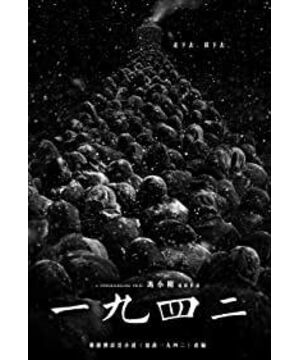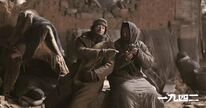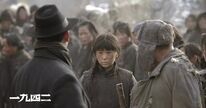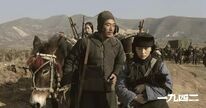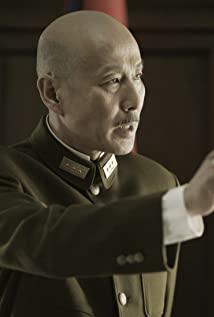From the ending point of view, "1942" is undoubtedly a cold tragedy. Thirty million people who fled the famine went into exile all the way, and gradually withered due to war, disease, cold and starvation, and in the end they were not saved. For the survivors, decency, dignity and even national justice have become unprecedented hesitant. In this battle for survival, there are no winners, only the survivors who have survived the hardships.
Guanzi said, "Canglin knows the etiquette." If you don't have enough food, everything will become light in hunger. Sex, body and even personal freedom have become tools to be sold in exchange for food. The traditional values built by propriety, righteousness, integrity and shame have become thin as cicadas amid unprecedented hunger. Not only have traditional Confucian patriarchal concepts been abandoned, but even Basic family ethics are also starving, dizzy, and vulnerable—husbands sell their wives, fathers sell children, and all kinds of adultery and robbery, to name a few. Although there is a solid foundation for the original work, before the filming of the film, director Feng Xiaogang still went to the field to investigate and collect historical materials many times, but the historical facts were too horrifying. In our film market without a rating system, the director had to abandon a lot of "exciting" films. material, and greatly weakened the moral and ethical impact of starvation in the movie (of course, taking into account the acceptance of ordinary audiences), but even so, when we saw "1942" in the cinema, its The level of shock is also unmatched by domestic films in recent years.
Amartya Sen, winner of the Nobel Prize in Economics, pointed out in his research on the Great Famine that the cause of a comprehensive famine is often not the lack of total food supply, but the individual rights such as information blockade and unfair distribution. of "poverty". Natural disasters and man-made disasters, natural disasters are ahead, but the last straw that can overwhelm the camel is man-made disasters. In 1942, the water and drought locust soup, Henan fellows never forget to add that "soup". The film "1942" is basically divided into two major clues, one is the escape of the old club and others, and the other is the measures taken by the Nationalist government to deal with the famine. Of course, the Japanese aggressor forces brought self-evident difficulties to disaster relief, but the Nationalist government was still corrupt, corrupt, and extortionate during the famine. this disaster. If it wasn't for the fact that American journalist Bai Xiude reported the famine truthfully and put pressure on Chiang Kai-shek through the U.S. government, I'm afraid Chiang would not have opened the warehouse for a long time (this story line is also presented in the movie). On the whole, "1942" basically and objectively restores the disregard of the Kuomintang government and the Kuomintang army for the disaster victims - even if there is Li Peiji's diligent consideration, but the political environment is corrupted, and a clean official can't reverse the situation.
China's modern history is a history of many disasters. The huge crisis of national survival has always made "salvation overwhelm enlightenment". Therefore, humanitarian disasters are often covered up or distorted. for heavy. However, if the problem of eating is not solved, how to solve other problems? "1942" also presents the historical facts that the Japanese aggression army used rations to help the victims. Of course, there is not much writing. The film also hurriedly explained the tyranny of the Japanese army - the Japanese devils gave the victims a life-saving white bun, but Next is the indiscriminate killing. Obviously, there is a theme of conflict between nationalism and humanitarianism hidden in the depths of "1942", and the director has to be careful when dealing with this sensitive theme. It should be said that the current appearance of the film is in line with the big historical facts, and it will not give anyone a handle on its position.
According to historical records, due to the different attitudes of the national army and the Japanese army towards disaster relief, a great turning point has taken place in the inclination of many Henan villagers during the war: it is said that about 50,000 Chinese soldiers in the Central Plains were disarmed by local people and lost. In terms of combat effectiveness, when the national army was at war with the Japanese army, when the wounded of the Japanese army were evacuated, fellow villagers rushed to carry stretchers, and many fellow villagers personally led the way, helping the Japanese army to pursue those desperate national army skirmishers, and even more. There are also many examples of ordinary people helping the Japanese army to disarm the national army into an organized system.
History is complicated. When the great famine made all solid things become light, the "1942", which recorded this history, became heavy. The index finger wrote in the poem: "The reason why I firmly believe in the future , I believe in the eyes of the people of the future - she has the eyelashes to brush away the dust of history, and she has the pupils to see through the chapters of the years." When we "the eyes of the people of the future" stared at "1942" on the big screen , our eyelashes are brushing aside the dust of history, and our pupils are seeing through the chapters of the years - a belated but necessary consolation to compatriots who have experienced that catastrophe.
(Published in the 45th issue of Nandu Weekly, 2012)
View more about Back to 1942 reviews


